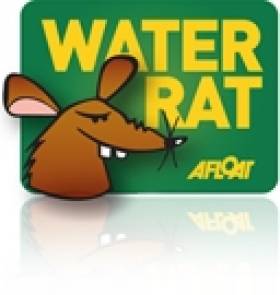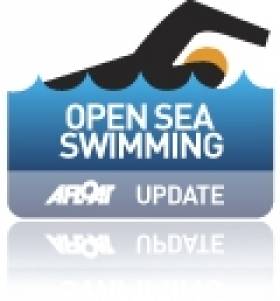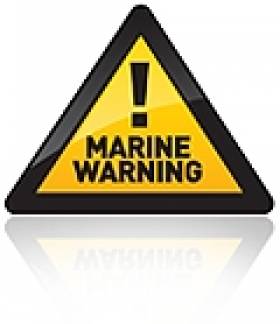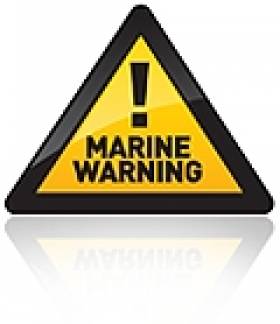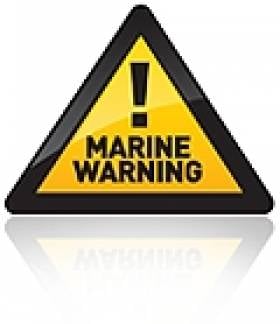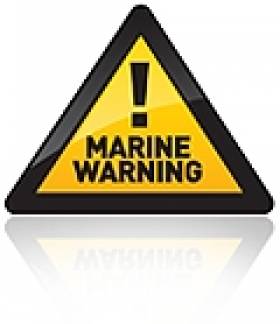Displaying items by tag: water
Should Ben Ainslie Land in Hot Water?
#BEN AINSLIE – As Britain's sailing superstar awaits a hearing with the Royal Yachting Association (RYA) over the incident at the World Championships in Perth last December, the consensus in the electronic media is that he has been hard done by and blame should be attributed to the media boat that caused the wash that was at the centre of the row. While quite a few of the commentators believe that the two race disqualification for gross misconduct that cost Ben Ainslie the World Championship is more than adequate punishment, Water Rat sees some similarities with soccer star Eric Cantona's transgression in 1994 that resulted in 120 hours community service and an 8 month ban from the sport.
To re-cap, Cantona was sent off in a Manchester United v Crystal Palace game for a kick on a Palace defender. As he reached the sideline Cantona launched himself into the stands and kicked a supporter in a kung-fu style following up with a series of punches. Cantona was arrested and convicted for assault, but the original two week sentence was overturned and replaced by 120 hours of community service. His team, Manchester United, suspended Cantona for the remaining four months of the season and he was fined £20,000. The Football Association increased the ban to eight months and fined him a further £10,000. Football's International body, FIFA confirmed the suspension as worldwide. Cantona also lost the captaincy of the French team.
The International Jury found as fact that Ainslie had committed an act of physical aggression, that was not only a gross breach of good manners but also brought the sport into disrepute.
The Football Association's statement is worth quoting: 'The members of the FA Commission are satisfied that the actions of Eric Cantona following his sending-off at Crystal Palace in the Manchester United match on January 25 brought the game into disrepute. Eric Cantona has therefore been in breach of FA rules. After taking into consideration the previous misconduct of Eric Cantona, the provocation he suffered, the prompt action taken by Manchester United, Eric Cantona's expression of regret to the Commission, the apologies he conveyed to those affected and the assurances he gave to his future conduct, the members of the Commission decided that Eric Cantona should be suspended forthwith from all football activities up to and including 30th September 1995 and in addition fined £10,000.'
It is worth noting that Ainslie also apologised, but his reaction to the Jury's decision was to criticise their reaction. RYA's Olympic Manager also denied that an assault occurred.
Respected sailor, sailing author, judge and America's Cup umpire Brad Dellenbaugh commented: "It's interesting to see the spin, particularly from the RYA. While not condoning Ainslie's actions, it seems they are trying to lay this at the feet of ISAF for inappropriately trialing new television initiatives at the Worlds, then at that feet of the Jury for not letting the Championship be determined by the sailors on the water. The chance to win his sixth Worlds was taken away from him.
What fails to get mentioned is that he WAS winning the Worlds despite getting screwed by the wake. Stay in his boat; win the Worlds. The reason he didn't win the Worlds is because he couldn't control his anger and he boarded another boat. Period! I wonder how Elvstrom would have reacted."
The RYA Tribunal will now consider the incident and the sailing world will be fascinated to see how they deal with Ainslie. RYA's own guidance to Race Officers rates physical or threatened violence as 4-5 on a scale of 1-5.
Despite the apparent overwhelming sympathy it is difficult to see how RYA can avoid further sanction in this case. The question probably is what is an appropriate penalty. Given the strength in depth of Britain's Finn sailors, a ban of Cantona-like proportions would not cause great damage to GBR's prospects, but many would feel that denying (for the time being anyway) Ainslie's opportunity to become the greatest sailing Olympian would be too harsh.
Ainslie won the British trials comfortably securing the nomination almost a year in advance. Maybe a re-trial would be a just punishment, opening the door a crack for Giles Scott and Ed Wright. For Ainslie, being asked to prove himself again might not be much more than an inconvenience, but the message sent by the Tribunal would clearly state that no person, however great their stature, is beyond reproach.
Round Fastnet Swimmer Nominated Again for World Award
#OPEN SEA SWIMMING – A Cork man has been nominated as World Open Water Swimming Man of the Year 201. Stephen Redmond, from Cork, has accomplished some of the world's toughest marathon swims.
One of 1, 200 to have swum the English Channel and one of only 12 to have swum the North Channel (between NI and Scotland) - Stephen is a superstar in the sport.
{youtube}1Hw4YIdu6MY{/youtube}
In a short period this autumn Stephen added the well known Catalina Channel to his list of accomplishments soon after he became the first swimmer ever to swim around the Fastnet Rock. Going around the rock is not the 300 meters you might think. Stephen started in Baltimore, circled the Fastnet and finished in Schull.
For the second year in a row he has been nominated for this global award.
Nominations for the annual World Open Water Swimming Man of the Year were announced today by Open Water Source.An eclectic group of 12 accomplished individuals from 9 countries were selected among the millions of athletes in the fastest growing sport in the world.
Their stories, their exploits and their lifestyles are extraordinarily inspirational as they are all passionately attracted and committed to a sport inherent with risks, challenges and beauty.
These awards not necessarily for the best athlete, but are meant to honor the individual who (1) best embodies the spirit of open water swimming, (2) possesses the sense of adventure, tenacity and perseverance that open water swimmers are known for, and (3) has most positively influenced the world of open water swimming in 2011.
In Tramore today, Council noted with some degree of satisfaction that the total number of drownings in Ireland in 2010 was 112, the lowest figure since 1952 when 104 people drowned. The highest figure recorded in any one year to date is 229 in 1994.
On average in Ireland there were 150 drownings each year in the decade to 2010, during which Irish Water Safety developed a range of educational and promotional campaigns to raise awareness about water safety which obviously is attaining a desired goal.
Speaking about the reduction in drownings, Minister for the Environment, Community and Local Government - Phil Hogan, T.D said: "112 lives lost to drowning in 2010 represents a 23% reduction compared to 2009 when 145 drowned. This reduction is a positive indication that the monies invested by Government, local authorities, corporate partnerships and the work of voluntary members promoting water safety nationwide are paying dividends in the saving of lives and the prevention of avoidable tragedies that devastate families and communities. I urge everyone to respect the dangers and to stay vigilant at all times. To stay aware is to stay alive." Continuing, Minister Hogan congratulated the Council and the members of IWS for their contribution in achieving a reduction in the numbers drowned.
Commenting on the decrease, the Chairman of IWS, Frank Nolan said: "We have ended a decade in which we can report that drownings in Ireland in 2010 were at their lowest for 58 years, reason enough to be confident that the work of Irish Water Safety and our partners in the public and private sector is having the desired outcome - more people enjoying our wonderful aquatic facilities more safely."
"That said, complacency is not an option for anybody as the statistics frighteningly reveal." continued Nolan. "Although 85% of accidental drownings were male, the adage 'boys will be boys' is alarmingly muted by the tragic fact that the vast majority of accidental drownings were not boys at all but grown men - 48% aged 45-65, compared to 15% aged under 24."
"I appeal to all adults to make themselves more aware of the dangers in, on and around water." he added, "It only takes seconds for tragedy to strike and this can so easily be avoided if people take responsibility for their own safety by learning about the hazards in advance of any trip to our wonderful waterways. One such step is to read Irish Water Safety's guidelines at iws.ie."
Irish Water Safety's statistical analysis is available at www.iws.ie. Excerpts from some of the graphs reveal that*:
In the 1970's, we averaged 91 accidental drownings each year. We ended the 00's averaging 55. Last year the figure dropped to 33.
In the 1980's we averaged 207 drownings each year. We ended the 00's averaging 150. Last year the figure dropped to 112.
In 2010:
48% of accidental drownings were aged 46-65
15% of accidental drownings were aged under 24
27% of all drownings were aged 55-64
67% of all drownings were male
85% of accidental drownings were male
56% of female drownings were suicide
40% of male drownings were suicide
*Note that the figure for drownings in which the cause (accident/suicide/assault) remains undetermined for 2010 is 25. 2010 drownings: 112 (53 accident, 68 suicide, 25 undetermined).
Heat Waves Masks the Danger of Cold Water
The CEO of Irish Water Safety, John Leech, has today warned about the increased risk of water related accidents and tragedies this weekend, thousands of marine leisure enthusiasts will take to our waters this weekend to enjoy our unique waterways. Complacency has been a factor in many Bank Holiday drownings. The public must take steps, including wearing a lifejacket to avoid becoming a drowning statistic. On average, twelve drownings occur in Ireland every month. We have lost too many people this year already, mainly because people did not wear a lifejacket.
Swimming, diving, angling, canoeing, surfing, windsurfing and kite surfing are popular holiday activities, ensure that you are adequately trained to undertake them and don't over face yourself early in the season.
Children are fascinated and attracted to water, it is critical that adults supervise children at all times around water, particularly children visiting farms where slurry tanks and open water is often unprotected.
Alcohol is a contributory factor in almost 30% of drownings, therefore I ask the public not to drink near water this weekend.
If you have not used your lifejacket or buoyancy since last year then you will need to carry out the following checks.
Detailed information on PFD's at http://www.iws.ie/guides-page24421.html
· If you are in distress or in doubt of somebody's safety, then call 112 and ask for the Coast Guard.
For water safety information for children www.aquaattack.ie
To report missing ringbuoy's www.ringbuoys.ie
For more information and details of water safety classes in your area log on to www.iws.ie or LoCall Irish Water Safety on 1890 420 202.
Weekend 'Super Moon' Increases Risk of Strandings
The moon will be at its closest to earth since 1993 on Saturday March 19th.
This "Lunar Perigee", or 'Super Moon' as some astrologers refer to it as, is the opposite of the "Lunar Apogee", when the Moon is furthest from Earth. Generally, the Moon looks about 12-14% larger at its perigee compared to its apogee.
This has the effect of causing very high and low tides, or increasing the range of the tide. This will expose large areas of beach and rocks which we normally don't see. Many people enjoy walking on our beaches and exploring these new areas of beach and in particular people enjoy picking shellfish to eat which become exposed during these very low tides.
The risk to the public will be of becoming stranded as the tide advances back in which can leave people in a position where they are cut off from the shore. Members of the public are cautioned to be aware of this risk and carry your mobile phone. Should you get in to trouble then call 112 or 999 and ask for Marine Rescue, giving your exact location and in particular if you are near to any conspicuous landmarks nearby to assist the Rescue Services in locating your whereabouts.
All seafarers, surfers, swimmers and divers should be aware of the increased tidal streams that will be running around our coast over the weekend; people could find themselves in peril as a result of these strong and fast tidal conditions which have not been experienced for some time now.
Coastal Flooding Risk Warns Irish Water Safety
Flood conditions expose the public to hazards they need to be aware of. Fast moving water can exert pressure of up to four times its speed against the legs of someone attempting to cross it. Because water displaces bodyweight, the deeper a person becomes immersed the less the person weighs so the more difficult it is to remain upright. Never put ones feet down if swept away in floodwater, because foot and body entrapments and pinning are the leading cause of accidental death in rivers and fast flowing water.
Motorists need to be vigilant to avoid flooded areas on roads but particularly near rivers; with poor light and short days it is not possible to determine the depth of floods easily. Swift water will carry cars and other vehicles away and there have been very tragic drownings in the past as a result.
Children are naturally curious about water, therefore parents should caution them that floodwater hides the true depth and that manhole covers may be open and that small streams when swollen are very fast and deeper than normal.
What should I do when I hear a Flood Warning?
· Listen to the national and local radio for met eireann updates and AA Road watch updates
· Check on neighbours particularly if they are elderly, infirmed or families with young children
· Move your vehicles to higher ground
· Move animal stock to higher ground
· Check your small craft to ensure they are well secured or moored
· Make sure you have warm clothes, food, drink, a torch and radio.
· Block doorways and airbricks with sandbags or plastic bags filled with earth. Floodgate products will also work effectively.
· Switch off gas and electricity supplies if flooding is imminent.
· Check the time of High Water in the Newspaper or on http://easytide.ukho.gov.uk/EASYTIDE/EasyTide/SelectPort.aspx
· Check out www.flooding.ie for more detail on General flooding
Personal Safety
· Avoid flood waters at all times
· carry a mobile phone at all times in case you need to call for help - call 112 in emergency
· Wear suitable protective clothing & a lifejacket on or around water
· Do not enter fast flowing water.
· Never put your feet down if swept away by fast flowing waters
· Flooding on roads will be deeper at dips and around bridges.
· Stay away from sea and flood defences.
· when walking or driving, be aware of manhole covers and gratings that may have been moved due to the heavy flow of water.
· Take care when using electric appliances in damp or flood conditions.
· Remember that during the hours of darkness the dangers are multiplied.
After the flood
· Avoid eating food that has been in contact with flood water.
· Run water for a few minutes and wash your taps.
· Check gas and electricity supply.
· Leave wet electrical equipment alone to dry and have it checked prior to use.
· Ventilate your property well.
· Check on elderly neighbors.


























